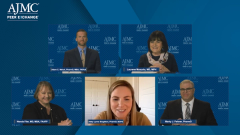
Financial Burden Associated with RSV
Financial impacts associated with respiratory syncytial virus infection are highlighted.
Episodes in this series

Adam C. Welch, PharmD, MBA, FAPhA: Dr Filer, what are some costs and burdens associated with RSV [respiratory syncytial virus] in adult patients?
Wanda Filer, MD, MBA, FAAFP: I think of costs in a bunch of ways. There are the financial costs. Clearly, if a patient ends up in an emergency department in the hospital, heaven forbid in the ICU [intensive care unit] on a ventilator, those are substantial costs. But there’s also the cost of missed time at work. There’s the inability to care for your family in the way that you want, to do activities, to have quality-of-life pursuits. Those costs are less tangible but very important to patients.
If a patient gets RSV, their likelihood of having damaged lungs and problems worsening of their medical condition afterward can be permanent, particularly in patients with lung disease. Patients with bone marrow transplant come to mind because their likelihood of getting pneumonia from this and having severe outcomes is brutal. They’ve invested a lot in their recovery of getting better from some illness, and we need to make sure they have every chance of being protected because there are costs in human terms as well as financial ones.
Adam C. Welch, PharmD, MBA, FAPhA: Those costs are significant. Ms Singleton, data suggest that 10% to 31% of patients who are hospitalized with RSV end up in the ICU. How does that number impact payers’ budgets when you think about RSV?
Abby Lynne Singleton, PharmD, BCPS: That’s a big number. The CDC [Centers for Disease Control and Prevention] estimates there are 60,000 to 160,000 hospitalizations for patients over 65 years old, but that’s most likely grossly underreported. Those numbers are probably low, and that’s a big burden on payers and the budgets. We want to keep our patients healthy. We want to keep them out of the hospital, out of the ICU. But sometimes patients need that care.
Adam C. Welch, PharmD, MBA, FAPhA: You say it’s underreported. A lot of patients may not realize they have RSV. They think it’s something viral, and they’re seeking care in our health care system. They’re adding to the burden of health care costs in this country. It becomes important to prevent RSV.
Marty J. Feltner, PharmD: Let’s not forget about staffing challenges that we all have. We use agency a lot in our hospitals and long-term-care facilities. Those numbers are through the roof, so your budget is already blown if you’re using agency. Let’s not forget about the staffing challenges we’re faced with at pharmacies, hospital settings, and in the medical community. If we can help prevent RSV infections, we can help decrease the amount of agency that we’d have in those types of settings.
Adam C. Welch, PharmD, MBA, FAPhA: It sounds as if there are a lot of costs associated with hospitalizations that are due to RSV.
Transcript edited for clarity.
Newsletter
Stay ahead of policy, cost, and value—subscribe to AJMC for expert insights at the intersection of clinical care and health economics.











